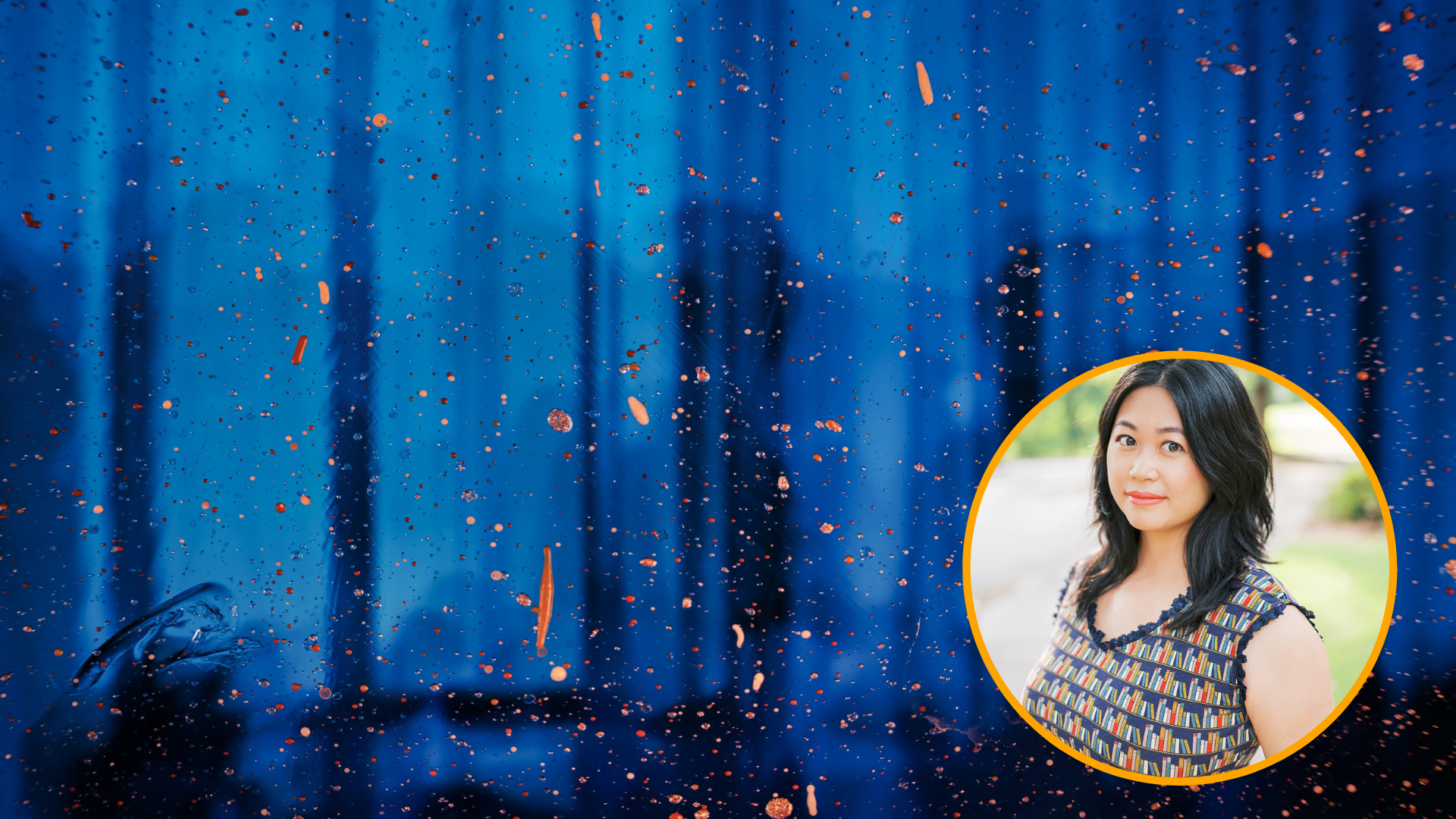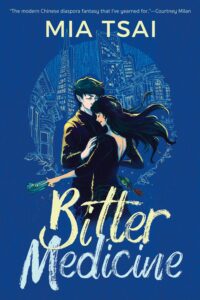
Mia Tsai is a Taiwanese American author of speculative fiction. She lives in Atlanta with her family and, when not writing, is a hype woman for her orchids and a devoted cat gopher. Her favorite things include music of all kinds and taking long trips with nothing but the open road and a saucy rhythm section. In her other lives, she is a professional editor, photographer, and musician.
Mia talked with us about her debut Bitter Medicine, escaping the real world through speculative fiction, and how her classical music studies came in handy while researching for the book.
 How did you first become interested in writing? What draws you to speculative fiction and fantasy in particular?
How did you first become interested in writing? What draws you to speculative fiction and fantasy in particular?
I’ve been writing since I was a kid, so I have a hard time remembering when I wasn’t telling stories—I think a friend and I were co-writing something, and that collaboration set into motion my desire to write my own work. I’ve been a bookworm my whole life, so this was the logical next step.
I love speculative fiction because I love magic; I loved being able to escape the real world and jump into a book where people could summon fire or befriend dragons (or both). These days, I like thinking up cool concepts, like what if horses were spirits of the wind and we could catch them, or what if we could experience other people’s memories through blood exchange? And then I have to answer my questions, of course. Stories spontaneously generate in the process of answering those questions.
Your debut Bitter Medicine follows the relationship between Elle, a low-level magical calligrapher at a fairy temp agency (and secret descendant of the Chinese god of medicine), and Luc, the agency’s top security expert and a half-elf with secrets of his own. As the two collaborate and grow close, their romance is complicated by dark pasts and conflicting loyalties. What inspired you to write this story?
Believe it or not, the original story set at the temp agency was about a different set of characters. The people in Bitter Medicine were characters I set in and around those other characters, and I used them to help flesh out the world, i.e. answer questions. If, for example, there’s a temp agency and one of the jobs is sending fae out to replace tooth fairies when they call in sick, then the agency should provide the supplies needed to ensure the temp can do the job correctly and well. Who makes those supplies? Someone like Elle, or Lira, or anyone else who is in requisitions and kits out the field agents heading out to do these jobs. Who might Elle encounter while at work? Maybe someone who asks for slightly strange or off-label glyphs.
Luc was sort of an answer to “Who is part of Elle’s clientele?” And when I stuck the two of them together, they grew backstories and ended up becoming rather compelling when they were together. I suppose there was no specific inspiration, per se. It was more like an improv game played on paper where I said, “Yes, and?” or “No, but…”
Although Bitter Medicine has a contemporary setting, Elle and Luc's world is lush with mythology and charmed with xianxia-inspired magic and glyph enchantment. How did you go about building this world? What role did research play in your writing process?
The original iteration of the temp agency was already international and had characters in places like the Isle of Man and New Zealand. There was no time in which the temp agency wasn’t an international organization, and since it was a fairy temp agency, fae from all over the world were eligible to work in it. I ended up having fun populating it with all sorts of legendary creatures, from urban legend to myth. I had a single rule, which was that all mythologies were valid no matter what, so that opened up the ability to include cryptids, mythological creatures, and pantheons from the world over.
I have a pretty good working knowledge of certain mythologies, and then I used a world mythology dictionary to help kickstart ideas. The bulk of the research was making sure timelines would work, as well as making the places referenced existed but were not specifically called out (a one-star Michelin restaurant in Strasbourg, for example, or confirming that a character could have been raised in a Catholic church in the late eighteenth century). Some of the research was fun—I spent an afternoon or two just reading eighteenth-century baptismal records from the Bas-Rhin area of France, though some people may not consider reading church records in Latin to be much fun. Thankfully, I can make my way through ecclesiastical Latin thanks to my classical music studies, so I had a good time!
Was there any aspect of the story, as you wrote it, that surprised you?
There’s this one scene that I can’t talk about because of spoilers, but one character asks a certain question, and as I wrote it, I got this pang of grief and hurt that I didn’t expect at all. Sometimes the pain you cause your characters is on purpose, and sometimes, the characters hurt you right back because what they’re saying goes straight to your emotional centers.
What are you proudest of within the book?
The action sequences, probably! And sequences that are . . . action-y. I also put a lot of jokes into the manuscript, so if I’ve made readers laugh, then I’m proudest of that.
Was there anything you read, listened to, or watched while working on Bitter Medicine that influenced its creation?
I was pretty cut off from a lot of media as I was writing Bitter Medicine. I tend to do that, retreat into the writing cave or the studio and work on something without the input or distraction of other media. I had a playlist for the book, but those songs were selected for scenes that already existed or characters who already existed, so it was the book that influenced the playlist and not the other way around. I tend to take in information and such before I start seriously writing, then go into seclusion and write the work, then come out and return to reading, listening to, and watching media.
What are you currently reading? Are there upcoming books that you are looking forward to?
I am actually not reading anything currently, unless you count the submissions for the magazines I edit and the unpublished manuscripts I have sitting in my inbox. I do have books on the way and a large, unwieldy, and rather embarrassing TBR pile. Diane Marie Brown’s Black Candle Women was just delivered to my studio today! So that’s the newest book on the TBR. I’ve also got Annalee Newitz’s The Terraformers and Simon Jimenez’s The Spear Cuts Through Water to read, as well as an arc of SL Huang’s upcoming book, The Water Outlaws, and a copy of Mike Chen’s Vampire Weekend sitting in my email. I just saw a preview of Emma Mieko Candon’s The Archive Undying today and I’m already obsessed with the prose, so that’ll go on the pile too. And my poor, neglected copy of Siddhartha Mukherjee’s The Song of the Cell is sitting on my desk, staring at me meaningfully each time I open my computer. I suppose that one counts as currently reading, though I don’t expect to make significant headway on it in the next couple of weeks!


